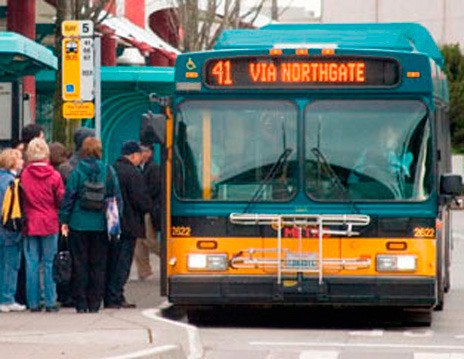Vehicle fees are going up next year in King County.
Vehicle owners will pay an extra $20 license fee in each of the next two years to help fund Metro Transit.
The Metropolitan King County Council voted 7-2 Monday to approve the fee, called a Congestion Reduction Charge. The fee goes into effect in 2012.
The Legislature recently authorized the county to charge a vehicle license fee. Any fee of $20 or less approved by the council does not have to go to voters for approval if a supermajority of at least six of the nine council members are in favor of the ordinance.
Councilmembers Julia Patterson, Kathy Lambert, Bob Ferguson, Joe McDermott, Larry Phillips, Jane Hague and Larry Gossett voted in favor of the fee. Reagan Dunn and Pete von Reichbauer opposed the fee and preferred to send the measure to voters to approve.
Patterson, whose District 5 includes portions of Kent, came out in support of the fee last month that will provide about $50 million in revenue over the next two years.
“South County residents commute further than anywhere else in King County,” Patterson said. “They rely heavily on bus service everyday to get them to work and back home to their families. Without this critical transportation lifeline we will be forcing more people to get in their cars and they will spend hundreds of dollars a year on gas and vehicle maintenance – a much greater financial impact than a $20 fee.”
Dunn, whose District 9 includes portions of Kent’s East Hill, wanted voters to decide whether the county should charge a vehicle license fee.
“I’m deeply disappointed that the majority of my colleagues found it necessary to deny the people the right to vote on this very important matter,” said Dunn, who is chairman of the council’s Regional Transit Committee, in a prepared statement. “There have been numerous votes on car tabs through the years and the people expect to have a say.”
County officials said Metro would have had to cut 17 percent from its budget in 2012 without the vehicle fee.
“Today’s action keeps buses on the streets, but this is only an interim measure,” said King County Executive Dow Constantine in a prepared statement. “This gives us time to work statewide on a permanent solution for funding transit and other critical transportation needs.”
Under the amended legislation adopted Monday by the council, King County Metro Transit will:
• Develop a Transit Incentive Program to provide eight bus tickets worth up to $24 for each car tab renewal. People can use the tickets for rides to work, play or special sporting events. They may also choose to donate the value of those tickets to a pool of nearly 150 human service agencies to provide mobility for those in need.
• Phase out the downtown Seattle Ride Free Area in October 2012. The Council’s 2009 performance audit called for Metro to update its formula for collecting revenues in the Ride Free Area (RFA). When first established in 1973 as the “Magic Carpet Zone,” a city subsidy funded 100 percent of the fares Metro no longer collected in that area. Today the city of Seattle pays Metro $400,000 a year to support the RFA, which is about 18 percent of the $2.2 million annual cost for Metro to operate the RFA.
• Increase the pool of funds that provides sharply discounted bus tickets to human service and homeless programs. Metro now discounts tickets worth nearly $2 million annually. The tickets are currently sold to human service agencies at 20 cents on the dollar. Metro will either increase the current ticket allocation, or further increase the discount while giving the public the option of donating their tickets under the incentive plan to those in need. Metro will seek the advice of human service agencies in how to best help those in need.
• Implement right-sizing of service consistent with the Transit Strategic Plan. In communities where it makes sense, Metro will deploy lower-cost, more efficient Dial-a-Ride Transit service (DART), community access transportation services, Vanpools and vanshares, making service more efficient and responsive to our riders.
• Consider routes that carry more riders due to the effects of highway tolling as candidates for added services. This language in the proposed legislation is consistent with the principles to enhance Metro’s productivity developed by the Regional Transit Task Force and adopted in the county’s Transit Strategic Plan.
For more information about Metro Transit, go to http://metro.kingcounty.gov/.
Talk to us
Please share your story tips by emailing editor@kentreporter.com.
To share your opinion for publication, submit a letter through our website https://www.kentreporter.com/submit-letter/. Include your name, address and daytime phone number. (We’ll only publish your name and hometown.) Please keep letters to 300 words or less.

